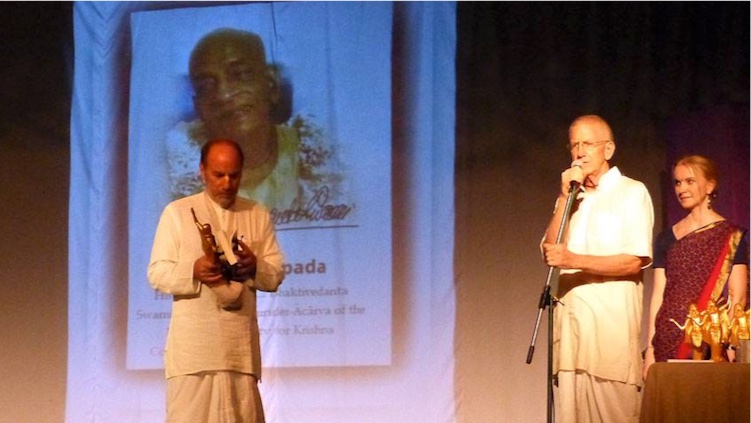2nd Vaishnava Film Fest Celebrates ISKCON Talent
By Madhava Smullen | Apr 15, 2016

The 2nd Annual Vaishnava Film Festival, held from March 18th to 20th in Mayapur, West Bengal, premiered new productions, awarded upcoming and veteran filmmakers, and showed how ISKCON is truly beginning to embrace the most popular medium of the 21st century.
Over the first two nights, held during the famous annual Mayapur festival, thirty trailers, shorts, and documentaries were shown in Srila Prabhupada’s Samadhi Auditorium. They were presented by co-organizers Nrsimhananda Das of ISKCON Television and Vasudeva Das of BhakTV.
Among the films shown were two of Vasudeva’s own. The 28-minute Tribal Care in Assam – receiving its premiere — showed Mayapur resident Bhakti Purusottama Swami and his team adopting tribal villages and helping them both philanthropically and spiritually.
Meanwhile in 2014’s two-part Mountain Monks travelogue – which received the Best Documentary award at the Kolkata International Short Film Festival – Vasudeva visits Himalayan Buddhist monasteries in Darjeeling and Sikkim, and takes a look at the similarities between Buddhism and Vaishnavism.
Montain Monks (Part One) by Vasudeva.
The high level of professionalism continued with the glossy 40-minute Reconnection, by husband-and-wife team Shyam Gopal Das and Vijaya Radhika Dasi, who are originally from Siberia and now run their own studio in India. The fictional narrative follows Sean Fletcher (played by Gaura Gopal Das), a social media connosseiur who can’t seem to connect in his real life relationships, as he discovers his true self in the sacred town of Vrindavan. The film won an Award of Excellence from the Best Shorts Competition.
Reconnection trailer by Shyam Gopal and Vijay Radhika.
Another powerful fictional short was Long Lost, from Russian writer/director Shaktyavesha Avatara Das. In it, professional actor John Gould plays a young London man searching for answers in life and finding Krishna consciousness. The film came in at third place in Russian film festival “I See God,” and was recommended by the London Film Academy.
Shaktyavesha Avatara is also part of an intriguing social media effort, Fortunate People, which films members of the general public receiving a Bhagavad-gita As It Is and chanting Hare Krishna for the first time, while dedicating the mantra to “world peace.” The latest video clip, “Great Mantra for Love and Peace,” created by Tamal Krishna Das, was shown at the Festival as an example of the principle of ‘Every Town and Village’ applied in the Internet Age – it received 20,000 views, 1,000 likes and 600 shares in just 24 hours.
One of the videos of the Fortunate People series.
One of the biggest hits of the Vaishnava Film Festival was For Tomorrow, written and directed by Jagannath Kirtan Das of Kriyate Productions. Dazzling in both its technical accomplishments like DOP Dhira Krishna’s warm, rich cinematography, and in its emotional depth, it moved many. In the 11-minute piece, endearingly-narrated by 12-year-old student Purushottama Das, we experience life at Bhakti Vidya Purna Swami’s Bhaktivedanta Academy ashram, and visit the construction site of the Temple of the Vedic Planetarium – while some clever animation brings it to life.
“It’s just such a mature, artistically impressive film, made with such flair,” Vasudeva enthuses.
For Tomorrow by the Kriyate team.
Audiences also saw two hard-hitting documentary films by Krishna-lila Dasi, whose work on environmental and humanitarian issues, interfaith dialogue and spirituality have been broadcast on TV channels around the world. In Nature’s IQ, we see one hundred incredible instinctive behaviors in the animal kingdom that challenge Darwin’s Theory of Evolution. And in Rescuing the Stolen River – which garnered much praise at Delhi’s CMS Vatavaran Environmental Film Festival – we see the harrowing effects of pollution in the sacred Yamuna River.
Rescuing the Stolen River trailer by Krishna-lila.
Also shown were Prananatha Das’ documentary, Govardhana Seva, about cleaning up the sacred hill; Ananta Vrindavan’s “music video” depicting Indradyumna Swami’s inspirational t


